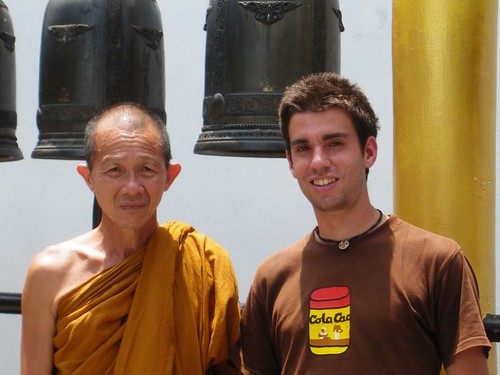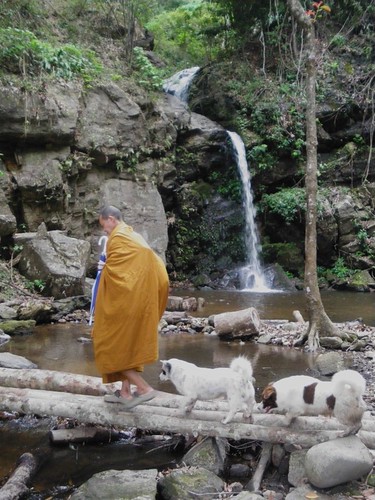Back in Holland, during one of my visits to the Joho shop in Leiden I met a very interesting guy called Marten. He had been traveling through Southeast Asia and he was willing to give me some useful hints. One of them referred to a legendary man, a former professor at the University of Chaing Mai. One day this good man decided to leave his job to become a Buddhist monk. He and two other men bought a small land among the rice fields near the northern mountains where they lived happily as forest monks. However the ex-professor -called Pongsa- missed some contact with the Western world. To solve this he came up with the great idea of hosting foreign travelers at their orchard. Nothing big, only friends of friends, people who had heard about it from other travelers.
 I contacted Pongsa (62, Thai) after my second day in the boring Chiang Mai. He invited me to the orchard which I accepted immediately. After my stage at the farm this was to be the second phase of my plan to meet the genuine Thailand. Three hours and two bus rides later I was picked up by a Burmese gardener who took me to Pongsa's place on his tiny scooter. The beauty of the site was only comparable to its simplicity. Three modest huts surrounded by fish-infested ponds and flanked by banana, mango and palm trees. It was getting dark so I set up my mosquito net and got ready to eat some snack before going bed. I offered some food to the monks but they refused. Later I would understand why.
I contacted Pongsa (62, Thai) after my second day in the boring Chiang Mai. He invited me to the orchard which I accepted immediately. After my stage at the farm this was to be the second phase of my plan to meet the genuine Thailand. Three hours and two bus rides later I was picked up by a Burmese gardener who took me to Pongsa's place on his tiny scooter. The beauty of the site was only comparable to its simplicity. Three modest huts surrounded by fish-infested ponds and flanked by banana, mango and palm trees. It was getting dark so I set up my mosquito net and got ready to eat some snack before going bed. I offered some food to the monks but they refused. Later I would understand why.I slept better than I expected. The concrete ground didn't bother me although the noise made by toads and water rats did wake me up a couple of times. The next morning Pongsa called me up at 6 am, he wanted me to drive him and the other monks to the village for his morning collect. He explained that Buddhist monks are not supposed to drive. That's how I became their choffeur for a few days. I walked with them around town to see how families offered some food that they collected in beautiful silver bowls. After this was done I drove the monks to their favorite restaurant where the four of us -in separated tables-had a XXL breakfast. It was then when Pongsa revealed the strange thing concerning the food. Buddhist monks cannot eat anything considered food after noon. This is meant to prevent the smallest desire to have sex, which is the most terrible sin that a monk can commit. For the same reason they cannot sleep on comfortable beds neither can they touch or be touched by any female. This last rule converted me in the virtual intermediary in all the processed that involved the exchange of items such as money and food between women and the monks. For the rest of the first and second day Pongsa guided me through the orchard describing the different fruits that their gardener grew there (since they are banned to do it themselves).
The next day and after the routine collect Pongsa and me got ready for a 2-day trek in the nearby mountains. Following the example of the skinny man I packed light, just a sleeping bag, a mosquito net and few clothes to be warm at night. Given the food constraints this was to be an endurance test for me.
We left the pick-up at the food of the mountain and started the climb. A few hours of dry forests preceded humid ones. The heat was unbearable. Then Pongsa suggested that we should take a shortcut. Of course I agreed - how could anyone question a former professor turned into a Buddhist monk, I though! Well, I hope Pongsa knows finances and marketing (his subjects at uni) better that he does the local trails because he lost the track which led us to the bloody middle of the jungle. To my surprise I happen to be a quite tough guy. I dealt just fine with the scorpions, little snakes and thorny bushes that we came across until I found the way out. Back on the trail we proceeded to the hill tribe village near where we wanted to spend the night. The tribe people were quite disappointing, apart from the language that they speak there are no major differences with the villagers that I met in other parts of the country.
We spent the night in a shelter near the headquarters of the Doi Suthep National Park. I waited until Pongsa went bed to have my limited supper consisting of fried pig skins and fruits that I had collected that morning.
 The second day in the mountains was different. We walked on the road until we reached a royal palace, the winter residence of HRM Bhumibol Adulyadej and his family. After a quick visit to the gardens we left the busy roads to re-enter the natural trails. The trail run along a series of beautiful waterfalls, the kind of thing that you only see in the movies. I splashed in almost every one of them, my friend didn't, too many (1) women around! Finally we walked/hitchhiked for another four hours until we reached the car.
The second day in the mountains was different. We walked on the road until we reached a royal palace, the winter residence of HRM Bhumibol Adulyadej and his family. After a quick visit to the gardens we left the busy roads to re-enter the natural trails. The trail run along a series of beautiful waterfalls, the kind of thing that you only see in the movies. I splashed in almost every one of them, my friend didn't, too many (1) women around! Finally we walked/hitchhiked for another four hours until we reached the car.This last 5 days have been some of the most interesting of my entire trip so far. Beyond the amazing places that I've seen, the amount of knowledge gathered during my talks with Pongsa is only comparable to two months reading the Wikipedia. Religion, politics, history, language, nature, food, culture... only now I feel that I could understand a little bit of this country.
Interesting things that I've learnt:
- Driving a car on the left side of the road.
- Driving a car through a forest trail (!).
- What I can and cannot eat in the forest.
- Bangkok is the name of one the neighbourhoods of the capital, only the misunderstanding of foreigners made it the official English name for the whole city.
- Farang -adjective used to describe the foreigners- stems from the French word francoix which the pioneer sailors used to address themselves on their arrival to Thailand.
- Every Thai boy is expected to become a monk for a short period of his life (at least 3 months). However younger generations no longer accomplish with this tradition.
- To prevent the desire of sex (worst sin ever!), Buddhist monks cannot touch or be touched by women, eat after noon or sleep on comfortable beds among other things.
- Buddhist monks cannot kill any living being, for that reason they cannot perform any kind of farming.
- Ideally, Buddhist monks cannot demand any special food, invest their money, or make any profit.
- There are two main kind of Buddhist monks in Thailand: forest monks and city monks (said to be the posh ones, you know, the kind that would dress fancy loud orange tunics!)
- The undisputed majority of the Thai society shows a tremendous respect for their monks whom they help out by giving regular donations in the form of food or money.
- Bhumibol Adulyadej might be the first honest, useful, good king that I've ever heard of. He's actually helped his people since his was crowned at young age by supporting thousands of projects (i.e. make it rain!). Although he doesn't involve much in politics (which has earned him lots of critics), he has stopped a couple of potential civil wars. People honour him everywhere (i.e. when I went to the movies in Bangkok I had to stand up while a patriotic video of His Majesty was shown at the beginning of the movie).
Mis ultimos 5 dias han sido algunos de los mas interesantes de todo el viaje. Y todo esto gracias a Pongsa, un antiguo profesor universitario que un dia decidio dejarlo todo para meterse a monje budistas. Aunque a priori en este pais todo hombre esta llamado al retiro espiritual durante al menos 3 meses de su vida, Pongsa decidio hacerlo tras su jubilacion. Ahora el y otros 2 monjes viven en una huerta entre los campos de arroz del norte del pais. Y alli es donde me desplace hace ya una semana. Los primeros dias los pase haciendo de chofer (esta mal visto que los monjes conduzcan) con una vieja camioneta. El amigo Pongsa me guiaba con instruciones en espanol: 'DELECHA' e 'IZQUIELDA', a lo que no podia contener la risa por lo absurdo de la situacion. A las 6 y media de la manana les llevaba al pueblo a por la colecta matutina. Era impresionante ver el respeto con el que las familias salian a la puerta de casa para ofrecer algo de comida o dinero a los monjes. Luego les llevaba a desayunar a su restaurante favorito. Una ingente cantidad de comida que habria de llenar sus estomagos para el resto del dia, pues los monjes no pueden comer nada despues del mediodia. Esta limitacion, junto a la de no poder dormir en camas confortables o la de no poder tocar o ser tocado por una mujer esta orientada a evitar el pecado maximo: el sexo. Gracias a Dios (valga la redundancia) yo no tenia que subscribir dichos votos asi que aunque me pegaba buenos desayunos junto a ellos (en mesas separadas), tambien cenaba algo despues de que ellos se fueran a la cama. Tras dos dias y dos noches en la cienaga (me gustaria recalcar lo de cienaga ya que dormia entre sapos y ratas de agua con la unica proteccion de mi mosquitera), Pongsa me llevo de excursion al monte. Estuvimos andando por los montes aledanos durante dos dias durante los cuales visitamos aldeas, bosques, un palacio real y un monton de cascadas que fueron mi tabla de salvacion para calmar el calor y la humedad de la selva. Gran semana esta ultima, he aprendido mas que en dos meses leyendo la enciclopedia!
0 comments:
Post a Comment